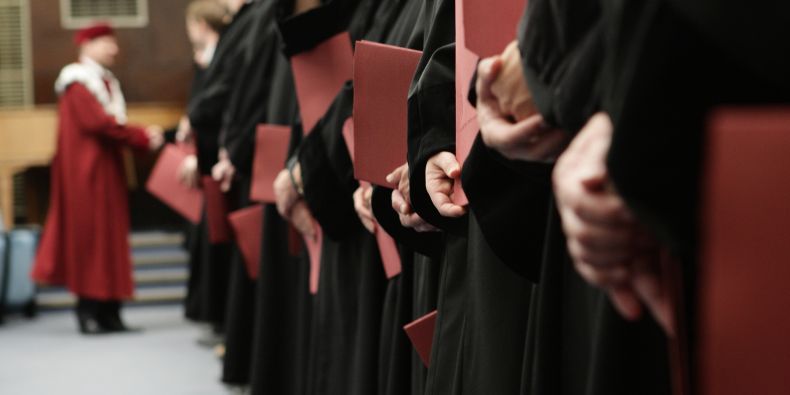To assemble all the graduates in one place, an area the size of ten Eden football stadiums in Prague would be needed. Since 1919, Masaryk University has awarded 200,000 diplomas to its graduates. More than half of them have been awarded since 1990 when university education became available to more students.
Self-reliance and the ability to work with information and learn new things is how those who recently graduated describe the most important benefits of studying at Masaryk University.
“Willingness to learn is the biggest advantage of new graduates – they are used to acquiring information and many consider it a matter of course. If you are proactive and want to move forward, this attitude can win you a job and get employers on your side more easily than if you have knowledge and experience, but you aren’t willing to adapt to new trends in the job market and have no interest in personal development,” says Pavla Horáková, a career counselling manager from the MU Career Centre.
Surveys confirm graduate satisfaction with their studies at Masaryk University: 80 percent get a job in their area of studies and the same number would choose the same university if they had to choose again. Based on the latest OECD report on the state of education around the world, having a university degree in the Czech Republic is a real advantage both in terms of employment rates and salaries.
Those with a post-graduate (master’s or PhD) degree earn almost double the pay of secondary school graduates. Moreover, the gap has been increasing in year-on-year comparisons. While the 2015 report stated that university graduates earned around 75 percent more, this figure rose to 95 percent in 2016.
There are also huge differences when it comes to job opportunities. In the Czech Republic, the average unemployment rate among people with a bachelor’s degree is only about three percent. For those with a master’s degree, it is even lower at about two percent. On the other hand, the average in the whole of Czech Republic has recently been at about five percent. Since the 1990s, university education has gradually lost its eliteness and become a mass phenomenon and is now a key prerequisite for a successful career.
“While a university degree is still a great advantage, the number of those who hold it has increased and so companies now have other requirements as well. The specific course of study can often be less important than the competence and knowledge gained during the studies. Where you obtain your degree may also play a role. For a number of employers, a degree from Masaryk University is a signal that the job candidate has a strong educational background,” says Horáková.
Demand for university graduates is going up
However, it still seems that the demand for university graduates is going up rather than down. Statistical data shows that the Czech Republic is below the OECD average when it comes to the number of adults with a university degree. Based on the 2015 report, only 22 percent of adults in the Czech Republic have completed tertiary education, while the average in the OECD countries is around 33 percent. The number is often higher in Western Europe: the UK and Ireland report 38 percent while in Canada, which is at the top of the charts, more than one out of every two people have a university degree.
Masaryk University surveys also show that getting a job is not a difficult task for university graduates. In recent years, more than half of Muni graduates had a job at the time of graduation, while the remainder took an average of 4.5 months to find one, with their first job usually being in Brno. Last year, 80 percent of new graduates said they found it easy to get a job.
“I never had a problem finding a job,” says Beata Holá, who graduated in journalism and psychology. “It particularly helped that I have always been very proactive and never expected the job of my dreams to just fall from the sky. I worked in my field since my first year at the uni.” She now works as a talent coach although her first jobs were in journalism. She later applied for a job in psychology in Vienna but work permit complications finally led her to adult education and eventually to talent management.
Last year’s Muni graduates have indicated that their starting salaries were, on average, over 28,000 Czech crowns. However, there are large gaps between the individual faculties. The highest starting salaries are currently in IT: over 35,000 Czech crowns a month. Lawyers, on the other hand, have the lowest starting salaries of around 20,000 although their remuneration starts to rapidly grow after a few years.
The OECD reports also highlight the non-financial benefits of education, both for the individual and for society as a whole. According to the reports, “People with a higher education more often say that they are healthy, participate in voluntary activities, believe in others, and think they can influence the government”.
